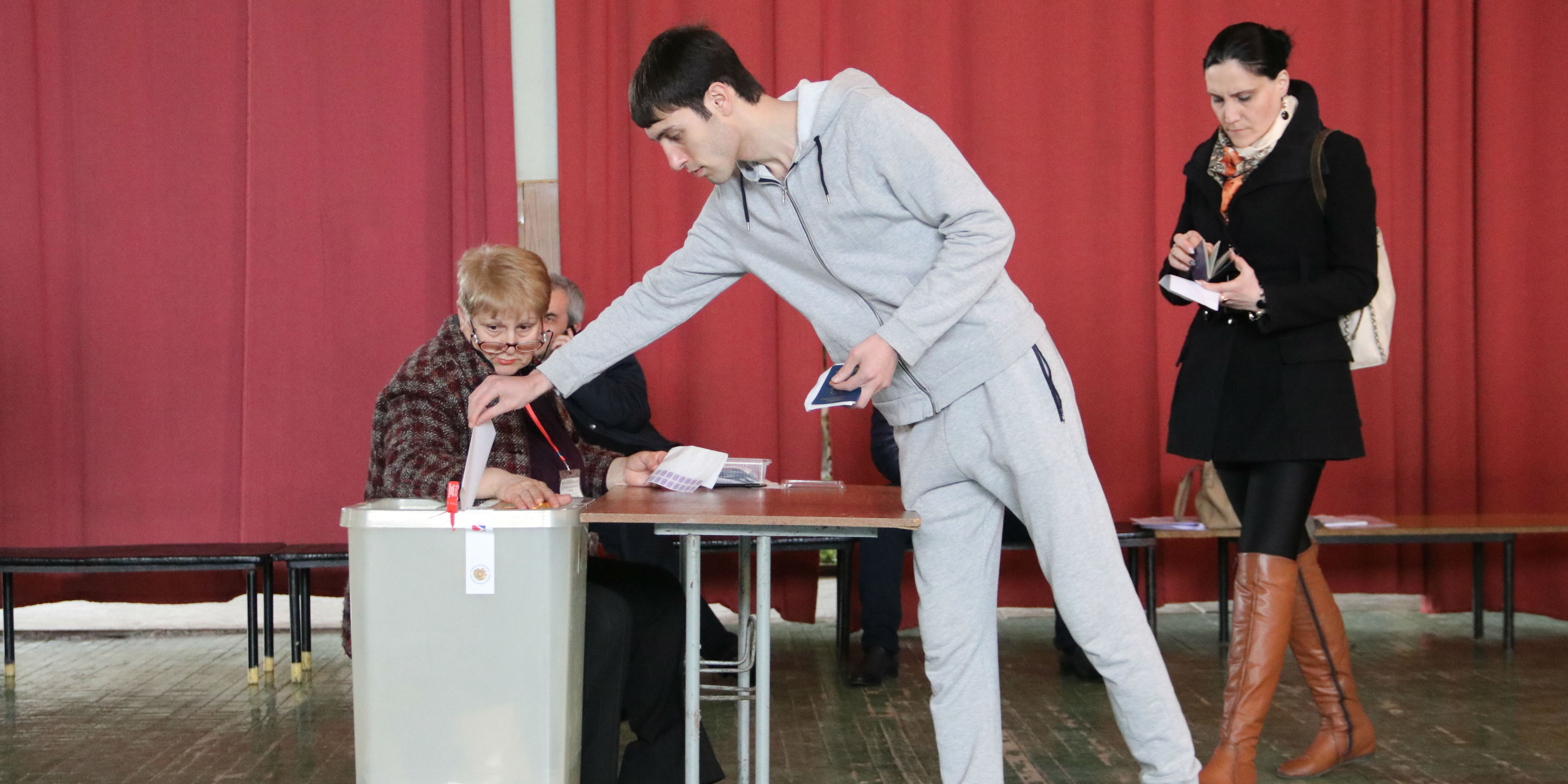Electoral observation missions promote competitive elections in autocracies
As elections have become more frequent across all regimes, Electoral Observation Missions (EOM) have increased their presence around their world. However, it has not always been clear whether EOM have an impact, and what exactly that is. Nasos Roussias and Rubén Ruiz-Rufino addressed this issue, examining elections from more than 100 countries around the world between 1976 and 2009. They show that EOM presence results in improvements of the competitiveness of elections, but only in autocracies, where they reduce margins of victory for incumbents and increase the likelihood that the opposition will take over, whereas they have no traceable impact in democracies.
 OSCE election observation mission, Armenia. Picture: OSCE Parliamentary Assembly, via a (CC BY-SA 2.0) licence
OSCE election observation mission, Armenia. Picture: OSCE Parliamentary Assembly, via a (CC BY-SA 2.0) licence
In recent years, and particularly since the end of the Cold War, the occurrence of elections has mushroomed around the world, either in newly emerged democracies or in authoritarian countries. However, the quality of elections in nascent regimes, democratic or autocratic, is often in doubt, as incumbents frequently manipulate the electoral environment in their quest for re-election. Within this context, Electoral Observation Missions (EOM) have become more and more involved in monitoring elections, trying to improve electoral quality and promote democracy. But are EOM effective in improving electoral competitiveness? We argue in a recently published paper that EOM presence limits the ability of incumbents to use electoral manipulation, and consequently improves the competitiveness of elections, but this impact is only felt in autocracies.
In order to estimate the impact of EOM on electoral quality, one needs to understand the dynamics of elections and monitoring, as well as the incentives of key actors. First of all, for an observation to take place an international organisation (such as the EU, OAS or OSCE) has to be invited to monitor the election. Invitations are extended by incumbents and they entail providing access to monitors who scrutinise the electoral process, which could lead to a negative verdict if instances of manipulation are detected.
The presence of EOM creates an interesting dynamic for incumbents. On the one hand, incumbents may seek external legitimation of their regime, or foresee economic or other benefits from international endorsement of their elections. On the other hand, they wish to be re-elected and may be willing to use tools of electoral manipulation to enhance their chances. Thus, EOM presence is not costless for incumbents, as it creates a difficult trade-off: they do not want to reduce their chances of re-election, but they also want to avoid a negative EOM verdict. On top of this, since the end of the Cold War inviting EOM has become an international norm; not inviting a mission is considered tantamount to admitting electoral fraud, and therefore most rulers extend invitations.
Once monitors are invited, their presence conditions the ability of incumbents to use manipulation. Rulers, trying to avoid international condemnation, have to adjust their manipulation strategy so that it becomes less likely that monitors will detect it. This can manifest itself in various ways. Some rulers may simply reduce the extent of fraud; others may displace it, avoiding regions where they know monitors will be present, or try to conceal it. Additionally, the tactics used may change; less obvious tools (like media control, or tampering with registration lists) may be preferred, and incumbents may avoid more traditional, and easier to detect practices such as ballot stuffing. Regardless of how rulers try to avoid a revelation of their tactics, EOM presence increases the costs of fraud. As a result, the electoral environment should become less restrictive and open up opportunities for opposition parties. The reduction or displacement of fraud allows the opposition to conduct more effective campaigns and challenge incumbents more directly.
Crucially however, the impact of EOM presence should be more pronounced in authoritarian settings, for at least two reasons. First, the occurrence of electoral fraud is less common in democracies: according to our calculations roughly 50% of elections in autocracies and 30% in democracies were manipulated. This implies that the potential impact of EOM in reducing fraud is greater in autocracies. Second, opposition parties in autocracies, where the electoral environment is on average more restrictive, should be emboldened by the presence of monitors. This could help them become more vocal in denouncing fraudulent practices and in engaging in more energetic campaigns. The 2004 Ukrainian elections, and the events following allegations of fraud serve as a good example.
Figure 1: EOM effect on vote margin
Source: Estimation based on Model 1 from ‘“Tying incumbents’ hands”: The effects of election monitoring on electoral outcomes’.
We tested our expectations using a dataset with 580 elections from 109 countries from 1976 to 2009, which includes information about international monitoring and several other important variables. Empirically, we estimated the effects of EOM presence using OLS; we also accounted for an important selection issue – that incumbents decide when to invite or not an EOM – by using instrumental variables and matching, and results hold. Looking at the effect on electoral competitiveness we find that EOM presence reduces substantially margins of victory for incumbents, but this is only significant in autocracies. On average, the presence of monitors in autocracies translates to a reduction in the victory margin of incumbents of around 20%, a staggering finding (Figure 1).
However, one may wonder whether these effects actually translate themselves to a turnover in power. After all, incumbents can anticipate some of the EOM effects and may only decide to invite monitors when they are certain that their presence will not tilt the electoral outcome. Examining this we discover that having international monitors present results in more frequent opposition victories, but once again this is only true for autocracies (Figure 2). In monitored elections, the probability of opposition victories increases by about 14% on average, a quite significant impact.
Figure 2: EOM effect on opposition victory
Source: Estimation based on Model 4 from ‘“Tying incumbents’ hands”: The effects of election monitoring on electoral outcomes’.
The implications of our analysis are manifold. First, it shows that electoral observation can have a significant impact in improving meaningfully electoral competition, despite the attempts of incumbents to engage in, and conceal, manipulation tactics. Second, it highlights that this impact is not uniform; it is only in autocracies that EOM can leave a significant imprint; in nascent democracies political competition is arguably more open and the use of manipulation less extensive, reducing the potential impact of monitors. Overall, our research has some clear policy implications for international organisations working on promoting democracy: they should focus their efforts in autocratic regimes, where their observers are more likely to produce a tangible impact.
This post represents the views of the authors and not those of Democratic Audit. It draws on the authors’ article ‘“Tying incumbents’ hands”: The effects of election monitoring on electoral outcomes’, published in Electoral Studies.
About the authors
 Nasos Roussias is a Lecturer in the Department of Politics at the University of Sheffield. His research focuses on the interaction between institutions, parties and voters, with a particular emphasis on the strategic behavior of parties and voters, electoral fraud and party systems in new democracies.
Nasos Roussias is a Lecturer in the Department of Politics at the University of Sheffield. His research focuses on the interaction between institutions, parties and voters, with a particular emphasis on the strategic behavior of parties and voters, electoral fraud and party systems in new democracies.
 Rubén Ruiz-Rufino is Lecturer of Comparative Politics in the Department of Political Economy, King’s College London. His research deals with measuring the functioning of political institutions and the effect of political representation in regime stability and political accountability.
Rubén Ruiz-Rufino is Lecturer of Comparative Politics in the Department of Political Economy, King’s College London. His research deals with measuring the functioning of political institutions and the effect of political representation in regime stability and political accountability.







 Democratic Audit's core funding is provided by the Joseph Rowntree Charitable Trust. Additional funding is provided by the London School of Economics.
Democratic Audit's core funding is provided by the Joseph Rowntree Charitable Trust. Additional funding is provided by the London School of Economics.
Nice innovation.
Thanks for the updates